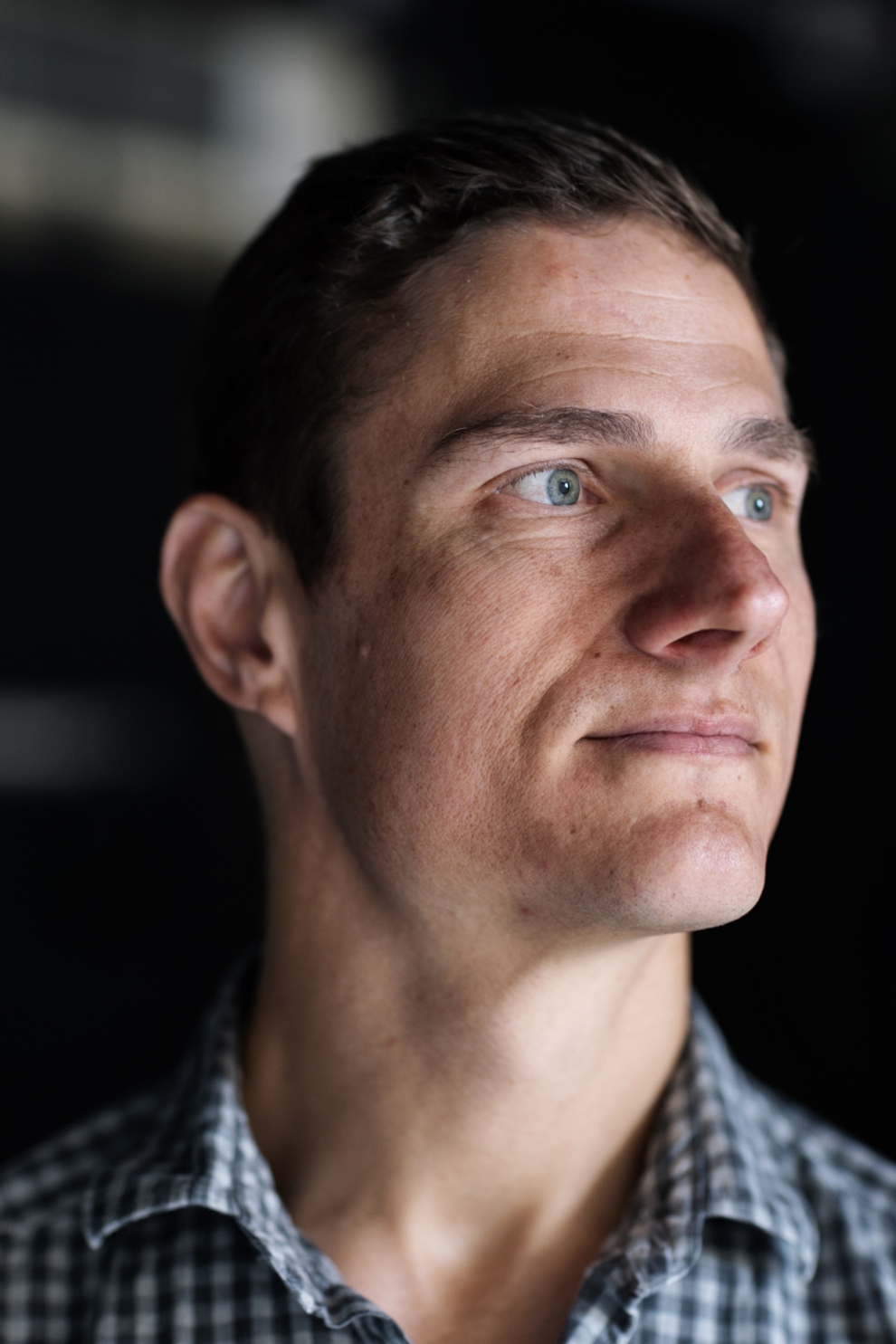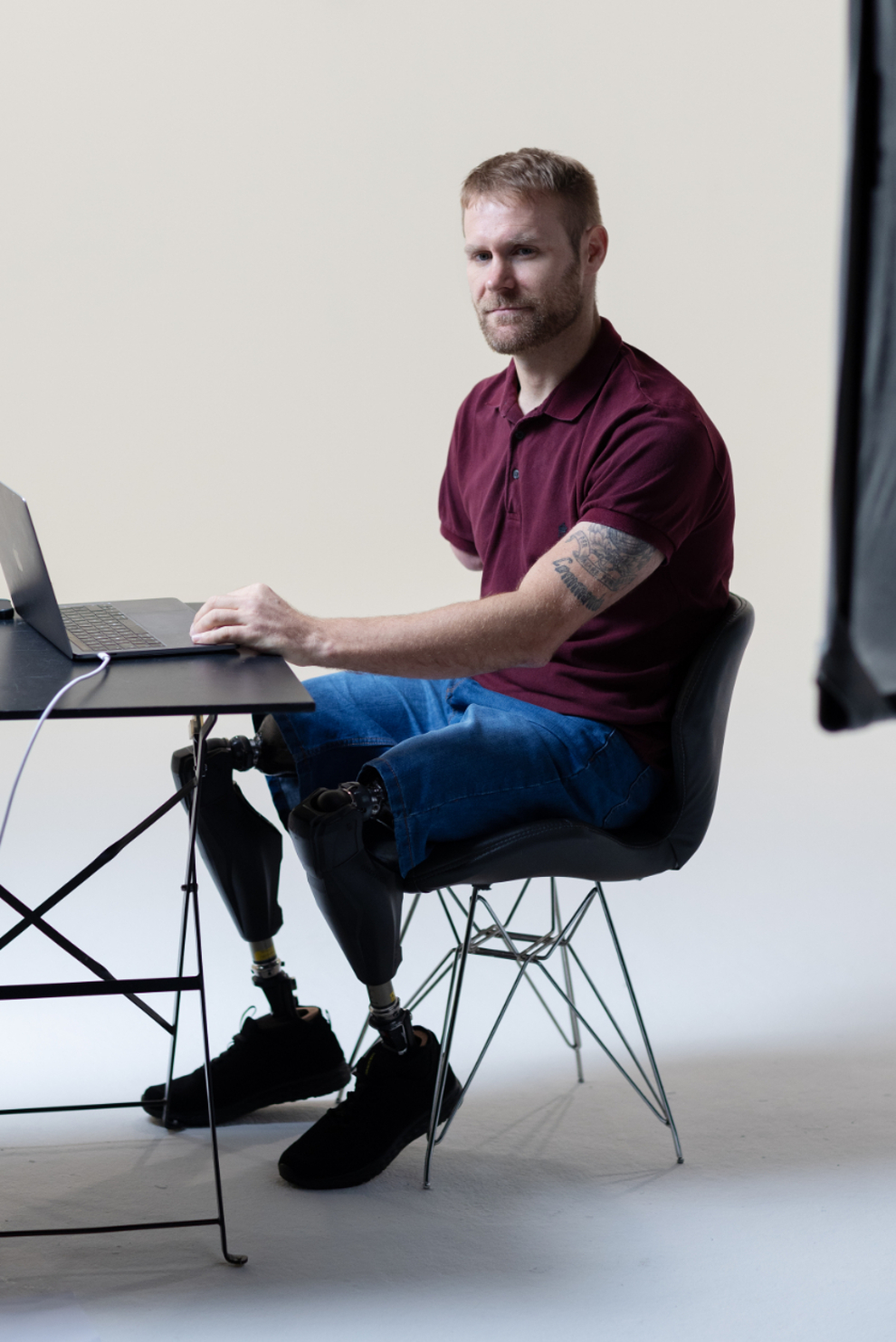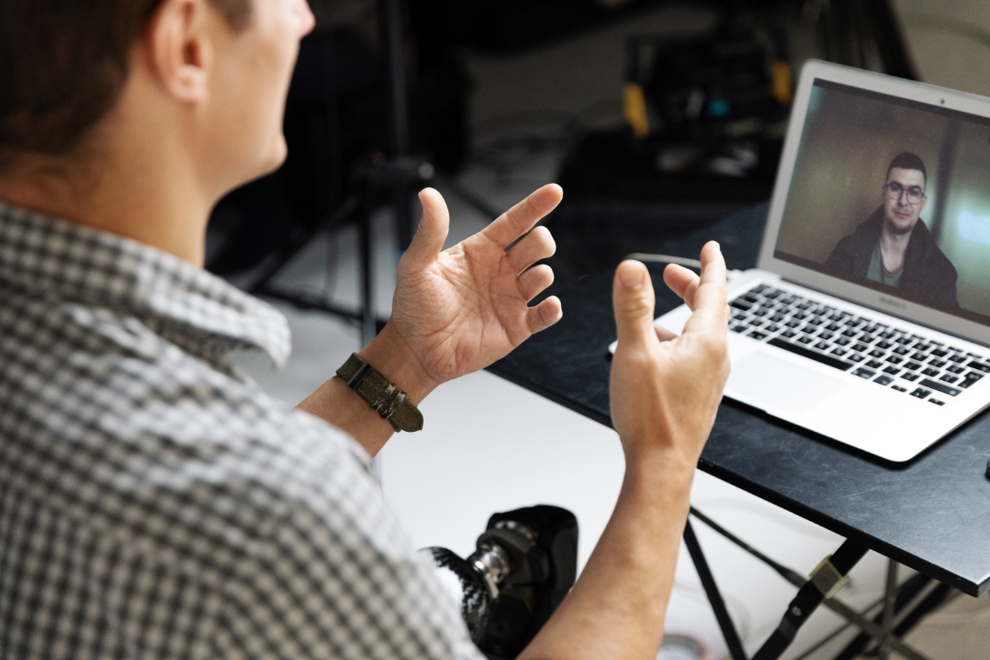Blesma Members have given their time to share their stories of resilience and rehab with Ukrainian soldiers coping with battlefield limb loss and injury. Members Mark Ormrod MBE and Stephan van Niekerk were linked up with two Ukrainian soldiers to share experiences and advice about their journeys after severe injury in Afghanistan.
Titled Conversations: Розмови (the Ukrainian translation), the innovative project connects amputee veterans from conflicts thousands of miles apart in an attempt to minimise the physical and psychological legacies of war.
It draws on Blesma and its Members’ unique understanding of how severe injury impacts soldiers and their families, and the importance of support throughout the rehabilitation journey and beyond.
Mark and Stephan were filmed in conversation with Vadym and Oleksii, who both suffered life-changing injuries in their nation’s fight against Russian forces. The landmark initiative, which is being delivered by The Drive Project and features a website hosting the conversations in both English and Ukrainian, goes live this month (March) just as the toll of Ukrainian forces amputees reached 50,000.
> Click here to watch all the films
“Ukraine is dealing with injuries and amputees on an unprecedented scale, and the legacy will last through generations,” says Tony Bloomfield, Blesma’s Operations Director. “Blesma’s experience dates back to WWI, and we have deep expertise in helping military personnel come to terms with limb loss and loss of use of limb and understand that their lives are not over.
“Rehab is a tough physical and mental effort, and our Members all say that the support of other soldiers who had experienced similar injuries was critical to their recovery.”
Mark Ormrod is a 40-year-old former Royal Marine who lost both legs and his right arm in an IED explosion in Afghanistan in 2007. “Finding military personnel who had experienced similar injuries but were further down the road helped change my mindset and opened my eyes to what was possible,” says Mark.
“It set me on a completely different path"
“Everyone who helped me played an important part in my recovery, but sometimes you have a question in your head that only another amputee can answer,” says Mark, who has won multiple Invictus Games gold medals and set endurance records since his injuries. “This has now come full circle, and I can help others through this awesome project.”
Mark, from Plymouth, spoke with Vadym, a Ukrainian Army paramedic who had his hands and feet amputated after being left for dead following a 2015 Russian ambush. “I have met Mark before, at the Invictus Games, and I thought he was a strong warrior,” says the 40 year old, who is an adviser to Ukrainian President Volodymyr Zelensky on the nation’s veterans’ rehabilitation programme.
“Speaking with someone like Mark, who has real combat experience, makes a difference because he understands the physical and psychological problems of dealing with limb loss. Veterans will be inspired by him and what he has achieved.
“It is good to be part of this project and it is my mission to help Ukrainian soldiers live with their injuries. I was the only one of 12 who survived the ambush and, to make sense of it, I have to help others.”


FINDING A BELIEF
Stephan van Niekerk was a 25-year-old Lance Corporal with the 3rd Battalion the Rifles when he stepped on an IED in Sangin Province, Afghanistan, in 2009. The double amputee has since become a sought-after motivational speaker, has raised funds for military charities, and is now in training for a 2,745-mile cycle ride from Canada to Mexico.
“After being blown up, I didn’t know what my life would look like or what I would be capable of. There were all sorts of concerns and anxieties going through my head, and people were saying I might never walk again,” he says. “It was only when I met others who had similar injuries but were up and walking around that I found a belief that I could have a life.
“Listening to them, hearing their stories and understanding the challenges was vital to me, and it has been a privilege to take part in this project and help Ukrainian veterans,” says Stephan.
Finding military personnel who had experienced similar injuries but were further down the road helped change my mindset and opened my eyes to what was possible

Stephan was filmed in conversation with 32-year-old Oleksii, who is still being treated in hospital for injuries sustained after a mortar strike, which killed one of his comrades, left him with severe internal injuries from shrapnel and needing an amputation to his right arm.
“That was in March 2023 and they are still removing shrapnel from my body today,” says Oleksii, who gave up a job as a successful software developer to enlist in the country’s Air Assault Brigade.
“I loved travelling, and my ambition was to have a house and family, but it seemed that was over with my injuries. Stephan shone a light where there was darkness. Hearing about him having a family, a business and a new life helped me realise that I do have a future. My rehabilitation is not over but nor is my life.
“It was powerful to listen to his story and I hope that one day I can speak to Ukrainian soldiers and help them in the same way. Just being able to help one person would be worth it.”
THE BOND THAT UNITES
Conversations: Розмови is being delivered by The Drive Project, the creative arts organisation behind Blesma’s award- winning Making Generation R programme and the Association’s new Storytelling and Wellbeing project.
“It was moving and inspiring to witness them all share their stories and see that bond that unites military personnel,” says founder Alice Knight-Driver. “There is a great power in storytelling, and it can help people move from being a victim to having some control. Mark and Stephan were effectively showing Vadym and Oleksii that they can have control, and it demonstrated how powerful people can be when they work together. The aim is that the conversations are seen by as many veterans as possible and that will help them start to rebuild their lives with positivity.”
Blesma has collaborated with the Citizen Foundation, a charity dedicated to improving the lives of injured Ukrainian soldiers by securing treatment, prosthetics and psychological support.
“We are very grateful that Blesma is ready and willing to share its incredible experience to give us a better understanding of how to deal with veterans’ problems whether they are physical, psychological or everyday life ones,” says Olena Schmidt, President of the Citizen Foundation.
Any injury affects us deeply at some level of subconsciousness. If we are talking about losing a limb, the major challenge is to accept yourself differently, learn to live with yourself, learn to accept the new life taking a new form and meaning.
“Every veteran has his or her own story and their personal experience of getting back to life after their injuries – therefore sharing this experience is always useful. These are like cobblestones that help everyone pave their personal way to a new life. This is why I believe all the participants have gained something very important and personal in the process of this project.
“There is a term in psychology related to support which is called ‘equal to equal’. It means that information and advice is well received and contemplated if given by those who have the exact same experiences. This is because these bits of advice are given out of someone’s own experience and relate exactly to the situation rather than being read somewhere in a book. Therefore, the advice given from one veteran to another in these conversations will be extremely useful, not only to the participants themselves but also to those who will watch the films later.”
> Click here to watch all the films
We can help
We are dedicated to assisting serving and ex-Service men and women who have suffered life-changing limb loss or the use of a limb, an eye or sight. We support these men and women in their communities throughout the UK. Click the link below to find out the different kinds of support we offer.
Get Support
Leave a comment
Join fellow Members and supporters to exchange information, advice and tips. Before commenting please read our terms of use for commenting on articles.